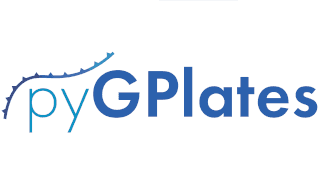Download GPlates and Data
Download GPlates
The current stable release of GPlates is GPlates 2.5, released in April 2024...

|
Download GPlates 2.5
(the latest “stable” release) |
The current stable release of pyGPlates is pyGPlates 1.0.0, released in March 2025...

|
Install pyGPlates 1.0.0
(the latest “stable” release) |
The current stable release of GPlately:

|
Install GPlately 2.0.0
(the latest “stable” release) |
GPlates
Ready-to-use binary packages are available to install GPlates on Windows, macOS and Ubuntu. These also include the GPlates-compatible geodata described below.
- For Windows, we provide an
.exeinstaller for a 64-bit version of GPlates on a 64-bit version of Windows. We also provide a.zipfile for users who wish to use GPlates without installing it. - For macOS on Intel (x86_64), we provide a
.dmgdisk image containing a 64-bit version of GPlates for Catalina (10.15) or above. - For macOS on Apple Silicon (arm64), we provide a
.dmgdisk image containing a 64-bit version of GPlates for Big Sur (11) or above. - For Ubuntu, we provide
.debpackages for 64-bit Ubuntu versions (that are currently under support).- If you are using a different Linux distribution please use the source code package instead.
These binary packages, and their installation instructions, can be found on the download page.
Source-code packages are also available for Windows (in a zip-file) and Linux and macOS (in a tarball) on the download page. Instructions on how to compile GPlates from source code can be found here.
Note: The source-code packages do not contain geodata. But there is a zip-file containing just the geodata.
You can also download older versions of GPlates:
PyGPlates
PyGPlates can be installed using conda or pip.
Please see the installation instructions in the pyGPlates documentation.
You can also download older versions of pyGPlates (prior to version 1.0):
Note: These older packages are not installed using
condaorpip.
GPlately
GPlately can be installed using conda or pip.
Please see the installation instructions in the GPlately GitHub Repository.
Download GPlates-compatible Data
Researchers in the EarthByte Project have made GPlates-compatible data available for use with GPlates.
A sample set of these data-files are also contained within the GPlates installation packages, and will be automatically installed with GPlates. This data has been updated for the GPlates 2.5 release. Thanks to the EarthByte Project for making these data-files available!
Go to EarthByte website for more data and models.
Download GPlates Logo

You may download GPlates logo in SVG format. Click here to download GPlates logo files.
Download PyGPlates Logo

You may download PyGPlates logo in .ai and .png format. Click here to download PyGPlates logo files.
GPlates Download Statistics
Click here to see the GPlates download statistics.